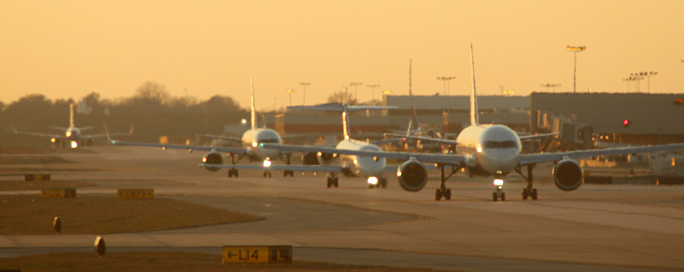J ohn Kelly has been appearing in various media outlets with comments pertaining to national security — and, more specifically, the former general and current secretary of the Department of Homeland Security of the United States has commented about what may be the impending ban on most electronic devices larger than a mobile telephone on all international flights to and from the United States.
“Are you going to ban laptops from the cabin on all international flights both into and out of the U.S.?” asked Chris Wallace of Fox News Sunday in this interview with Kelly which was broadcast earlier today.
“I might”, Kelly responded. “That’s a quick answer.”
“I Might” Expand the Electronics Ban to All International Flights To and From the United States: John Kelly
Although Kelly stopped short of committing to a definitive answer — most likely because of security reasons and that details of the plan to implement an expanded electronics ban on all international flights to and from the United States may have yet to be finalized — he acknowledged that there are “numerous threats against aviation, that’s really the thing that they are obsessed with, the terrorists, the idea of knocking down an airplane in flight, particularly if it’s a U.S. carrier, particularly if it’s full of mostly U.S. folks, people. It’s real. You know that I implemented I think on the 21st of March a restriction on large electronic devices in the cabins from ten points of origin.”
The “ten points of origin” to which Kelly is referring are ten specific airports which are affected by what are known as “aviation security enhancements” that were implemented on Tuesday, March 21, 2017:
- Queen Alia International Airport — AMM
- Cairo International Airport — CAI
- Ataturk International Airport — IST
- King Abdul-Aziz International Airport — JED
- King Khalid International Airport — RUH
- Kuwait International Airport — KWI
- Mohammed V Airport — CMN
- Hamad International Airport — DOH
- Dubai International Airport — DXB
- Abu Dhabi International Airport — AUH
Not a Matter of If — But When?
When Wallace asked Kelly about when the decision pertaining to the expanded electronics ban will be finalized and what is going to determine it, Kelly was again not committed to offering a definitive answer: “The very, very good news is that we are working incredibly close with friends and partners around the world. We’re going to, and in the process of defining this, but we are going to raise the bar for generally speaking aviation security much higher than it is now.” He continued that “there’s new technologies down the road, not too far down the road that we will rely on. But it is a real sophisticated threat and I will reserve that decision until we see where it’s going.”
Increased Screening of Bags Carried Aboard Airplanes
The Transportation Security Administration has been testing increased screening of bags carried aboard airplanes for items such as food and paper products where passengers may be required to unpack those items — as well as electronic devices and liquids “comfortably” sealed in a transparent zippered plastic bag with a maximum capacity of one quart — and place them into separate bins.
“The reason we’ve done that is because of — people trying to avoid the $25.00 or $50.00 or whatever it is to check a bag are now stuffing your carry-on bags to the point of, you know — well, they can’t get any more in there”, Kelly said when Wallace asked him as to whether or not the increased screening will spread to security checkpoints at airports nationwide. “So, the more you stuff in there, the less the TSA professionals that are looking at what’s in those bags through the monitors, they can’t tell what’s in the bags anymore.”
When pressed by Wallace, Kelly responded, “We might, and likely will.” This is dependent on the results of “working out the tactics, techniques and procedures, if you will, in a few airports to find out exactly how to do that with the least amount of inconvenience to the traveler.”
Based on what Kelly said, should airlines should stop charging for checked baggage? Will that solve the problem?
Summary
Kelly said during the interview with Wallace that “We — one of the great things about America, there’s many great things but we are a free and open society. And in many — and I wouldn’t change that at all. But that’s also one of our vulnerabilities. People can live their lives day in and day out, privacy issues, all of that, it’s a good thing. It’s what America is all about. But as I say, that is a vulnerability.”
Although I completely agree with the general sentiment of Kelly in that statement, the problem is that society in the United States is not as “free and open” as it was prior to Tuesday, September 11, 2001. We are constantly being watched on video recording devices. We are screened at checkpoints in stadiums, event venues — and even schools, in some cases — in addition to airports. Some of us are even paying the government to offer screening procedures at airport checkpoints which used to be free of charge in the form of trusted traveler programs such as TSA Pre✓ and Global Entry while volunteering personal information and fingerprints. Americans would have scoffed years ago at even the possibility of such programs being implemented.
There is a fine line between terrorism and crime — both of which have been around for as long as human beings existed. According to the Oxford Dictionaries, terrorism is defined as “the use of violence and intimidation in the pursuit of political aims”; whereas crime is defined as “an action or omission that constitutes an offense that may be prosecuted by the state and is punishable by law.” In many cases pertaining to violence, the two can be interchangeable…
…but advances in technology have exacerbated both terrorism and crime in recent years — not necessarily because there is more of both than in the past, which may or may not be true; but that information pertaining to both has become significantly more accessible. Information technology and social media has facilitated the spread of terror for nefarious individuals and organizations who will do whatever is necessary to ensure that people remain afraid.
.@DHSgov Sec. Kelly: If you knew what I do about terrorism, you'd never leave the house, but we do have the finest people protecting us. pic.twitter.com/qzqAqlqTGd
— FOX & friends (@foxandfriends) May 26, 2017
John Kelly said via Twitter that “If you knew what I do about terrorism, you’d never leave the house, but we do have the finest people protecting us.”
That is exactly what cowards who commit acts of terrorism want: to paralyze people in fear and gain more control over our lives.
I never had a doubt that the threats by those cowards are real — and I further believe that there have always been threats against commercial aviation in general — but I personally refuse to give into them and their demands. In fact, I do not even like calling them terrorists anymore because I believe that the mere word only further enables them and has them feeling more powerful while scaring people more…
…but the irony is that governments are creating policies and finalizing decisions which I believe do more to penalize ordinary citizens than protect them — the results of which causes some people to declare that “the terrorists already won.”
Let’s face it: life is not without risk. Every time you travel by car, light a stove powered by natural gas, smoke a cigarette, eat foods which contain ingredients thought to cause cancer — and board an airplane — you take a risk…
…and the risk of being directly affected by an act of terrorism is low, according to the statistics I used in this recent article. That does not mean we should not fight terrorism — and other acts of serious crimes, for that matter — as I fully believe that we absolutely should; but rather, we need to strive to keep developing methods of combating both terrorism and serious crimes while keeping the inconveniences to people in general as minimal as possible.
Simply put, we cannot be afraid — and as part of the fight against terrorism, we need to definitively show both cowards who want to commit acts of terrorism and government officials who are perceived to “caving in” to those cowards that we are not afraid and refuse to allow our daily lives to be impacted by them. In my opinion, this is the first — albeit small but necessary — step in the war against terrorism.
Photograph ©2015 by Brian Cohen.

